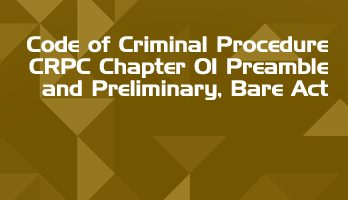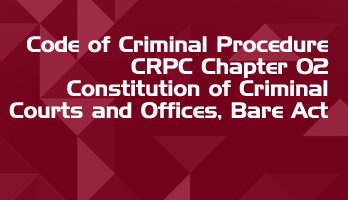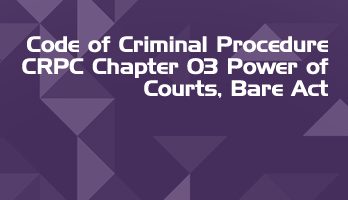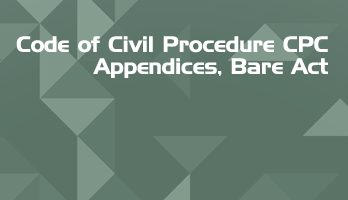A 'Bare act' is the actual legislation passed by the Parliament of India. Generally, an act sets out the high level legal and policy principles applicable to the subject matter of the law.
Most acts are accompanied by 'subsidiary legislation' such as rules, regulations, notifications and orders; which address the actual implementation detail of the act.
Free Full Course Available on LawMint's YouTube Channel
How to Land Your Dream LLB Internship in a Top Law Firm
- Part 1 - Introduction
- Part 2 - Internship Planning
- Part 3 - Internship Research
- Part 4 - Building Your Profile
- Part 5 - The Email
- Part 6 - The Resume
- Part 7 - The Cover Letter
- Part 8 - The Interview
- Part 9 - Self Development
Practical and comprehensive course, with real examples and step-by-step analysis of the complete internship application process. Check out LawMint's YouTube channel now!
Indian Penal Code, 1860
Chapter VI – Of Offences Against the State
Section 121 – Waging, or attempting to wage war, or abetting waging of war, against the Government of India
Whoever wages war against the Government of India, or attempts to wage such war, or abets the waging of such war, shall be punished with death, or imprisonment for life and shall also be liable to fine.
Illustrations
- A joins an insurrection against the Government of India. A has committed the offence defined in this section.
Section 121A – Conspiracy to commit offences punishable by section 121
Whoever within or without India conspires to commit any of the offences punishable by section 121, or conspires to overawe, by means of criminal force or the show of criminal force, the Central Government or any State Government, shall be punished with imprisonment for life, or with imprisonment of either description which may extend to ten years, and shall also be liable to fine.
Explanations
- To constitute a conspiracy under this section, it is not necessary that any act or illegal omission shall take place in pursuance thereof.
Section 122 – Collecting arms, etc., with intention of waging war against the Government of India
Whoever collects men, arms or ammunition or otherwise prepares to wage war with the intention of either waging or being prepared to wage war against the Government of India, shall be punished with imprisonment for life or imprisonment of either description for a term not exceeding ten years, and shall also be liable to fine.
Section 123 – Concealing with intent to facilitate design to wage war
Whoever, by any act, or by any illegal omission, conceals the existence of a design to wage war against the Government of India, intending by such concealment to facilitate, or knowing it to be likely that such concealment will facilitate, the waging of such war, shall be punished with imprisonment of either description for a term which may extend to ten years, and shall also be liable to fine.
Section 124 – Assaulting President, Governor, etc., with intent to compel or restrain the exercise of any lawful power
Whoever, with the intention of inducing or compelling the President of India, or Governor of any State, to exercise or refrain from exercising in any manner any of the lawful powers of such President or Governor, assaults or wrongfully restrains, or attempts wrongfully to restrain, or overawes, by means of criminal force or the show of criminal force, or attempts so to overawe, such President or Governor, shall be punished with imprisonment of either description for a term which may extend to seven years, and shall also be liable to fine.
Section 124A – Sedition
Whoever by words, either spoken or written, or by signs, or by visible representation, or otherwise, brings or attempts to bring into hatred or contempt, or excites or attempts to excite disaffection towards, the Government established by law in India, a shall be punished with imprisonment for life, to which fine may be added, or with imprisonment which may extend to three years, to which fine may be added, or with fine.
Explanations
- The expression – disaffection – includes disloyalty and all feelings of enmity.
- Comments expressing disapprobation of the measures of the Government with a view to obtain their alteration by lawful means, without exciting or attempting to excite hatred, contempt or disaffection, do not constitute an offence under this section.
- Comments expressing disapprobation of the administrative or other action of the Government without exciting or attempting to excite hatred, contempt or disaffection, do not constitute an offence under this section.
Section 125 – Waging war against any Asiatic Power in alliance with the Government of India
Whoever wages war against the Government of any Asiatic Power in alliance or at peace with the Government of India or attempts to wage such war, or abets the waging of such war, shall be punished with imprisonment for life, to which fine may be added, or with imprisonment of either description for a term which may extend to seven years, to which fine may be added, or with fine.
Section 126 – Committing depredation on territories of Power at peace with the Government of India
Whoever commits depredation, or makes preparations to commit depredation, on the territories of any Power in alliance or at peace with the Government of India, shall be punished with imprisonment of either description for a term which may extend to seven years, and shall also be liable to fine and to forfeiture of any property used or intended to be used in committing such depredation, or acquired by such depredation.
Section 127 – Receiving property taken by war or depredation mentioned in sections 125 and 126
Whoever receives any property knowing the same to have been taken in the commission of any of the offences mentioned in sections 125 and 126, shall be punished with imprisonment of either description for a term which may extend to seven years, and shall also be liable to fine and to forfeiture of the property so received.
Section 128 – Public servant voluntarily allowing prisoner of state or war to escape
Whoever, being a public servant and having the custody of any State prisoner or prisoner of war, voluntarily allows such prisoner to escape from any place in which such prisoner is confined, shall be punished with imprisonment for life, or imprisonment of either description for a term which may extend to ten years, and shall also be liable to fine.
Section 129 – Public servant negligently suffering such prisoner to escape
Whoever, being a public servant and having the custody of any State prisoner or prisoner of war, negligently suffers such prisoner to escape from any place of confinement in which such prisoner is confined, shall be punished with simple imprisonment for a term which may extend to three years, and shall also be liable to fine.
Section 130 – Aiding escape of, rescuing or harbouring such prisoner
Whoever knowingly aids or assists any State prisoner or prisoner of war in escaping from lawful custody, or rescues or attempts to rescue any such prisoner, or harbours or conceals any such prisoner who has escaped from lawful custody, or offers or attempts to offer any resistance to the recapture of such prisoner shall be punished with imprisonment for life, or with imprisonment of either description for a term which may extend to ten years, and shall also be liable to fine.
Explanations
- A State prisoner or prisoner of war, who is permitted to be at large on his parole within certain limits in India, is said to escape from lawful custody if he goes beyond the limits within which he is allowed to be at large.
Important Central Acts in Regional Languages
Legislative department website also features regional language versions of several important Central Acts.
Free Full Course Available on LawMint's YouTube Channel
How to Land Your Dream LLB Internship in a Top Law Firm
- Part 1 - Introduction
- Part 2 - Internship Planning
- Part 3 - Internship Research
- Part 4 - Building Your Profile
- Part 5 - The Email
- Part 6 - The Resume
- Part 7 - The Cover Letter
- Part 8 - The Interview
- Part 9 - Self Development
Practical and comprehensive course, with real examples and step-by-step analysis of the complete internship application process. Check out LawMint's YouTube channel now!












